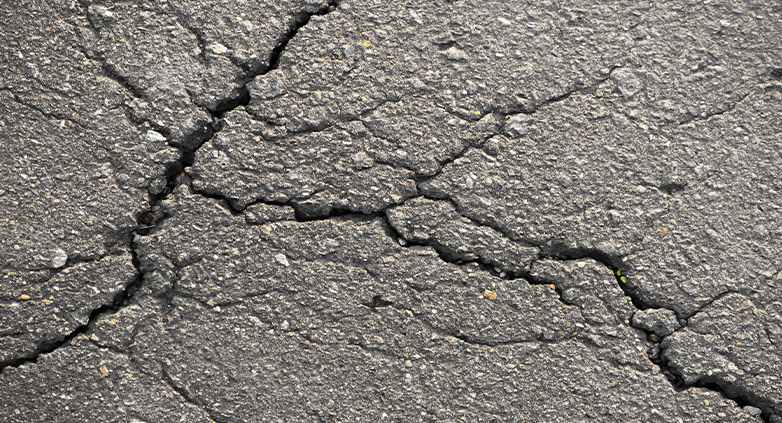How To Repair Cracks in Asphalt Driveway – 6-Step Procedure
Many homeowners choose asphalt as the most reliable construction choice for a durable driveway. However, you may sometimes need to fix cracks in your asphalt driveway to keep it in optimal condition.
Asphalt pavement may last for about 20 years if properly installed and maintained. A driveway should be resealed around every three years; more frequently, asphalt driveway cracks form and require repair. Asphalt driveway cracks are often caused by the aging process, a subbase shifting due to freezing and thawing. If left unattended, cracks will allow moisture to enter and eventually cause the sub-base beneath the asphalt to erode.
If you want to prevent the cracks in your pavement from worsening, you need to be proactive and fix them before they get bigger. That’s why we created this comprehensive guide on how to fix cracks in your asphalt driveway and the best fillers for your next asphalt driveway crack repair.
Tools you need to repair cracks in your asphalt driveways
If you’re unsure about how to repair cracks in your asphalt driveway, this straightforward guide will empower you to do it yourself. Stop hesitating and start repairing to prevent further damage to your driveway. To fix cracks in your asphalt driveway, you’ll need essential tools such as:
- latex gloves
- broom
- hammer or chisel
- pressure washer or garden hose
- wire brush
- asphalt crack filler
- tamper
- protective eye wears.
6 Steps to Repair Cracks in Asphalt Driveway
Now that you have gathered the tools, here are the steps needed to repair cracks in asphalt driveway.
1. Preparation and Cleaning of the Cracked Surface
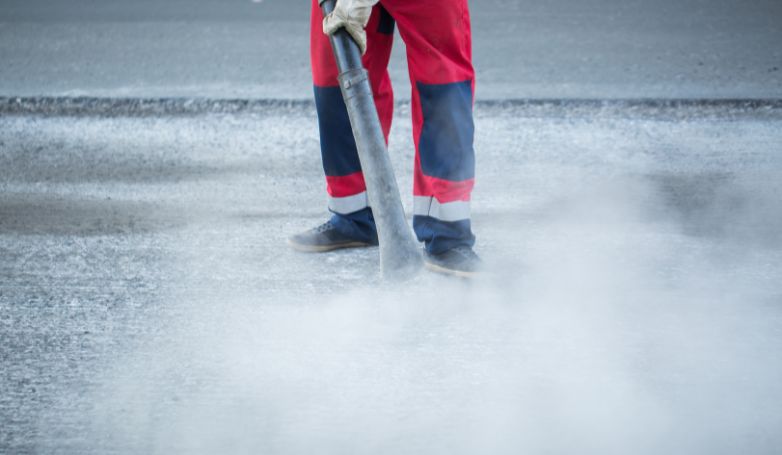
Before you fix cracks in the asphalt driveway, you must first prepare the cracked area. Clean and smoothen the cracked surface; this will help the crack filler to adhere to the surface and bind the cracked walls together. You can use a hammer to chisel out every rough patch away from the crack, and with a wire brush, remove dirt and debris from the cracks. A pressure washer will help you flush out knocked or loose pieces of asphalt fr.
2. Application of Asphalt Crack Filler for Small Cracks
The choice of asphalt crack filler depends on the nature and size of the crack. For smaller cracks, choose a high-quality asphalt crack filler and apply it conveniently using a caulking gun. Alternatively, if a caulking gun isn’t available, you can also apply the filler directly into the cracks with care. Fill the cracks completely, making sure to leave no air pockets that could compromise the integrity of the repair.
3. Smoothing the Filled Crack Surface
After filling the crack, the next step is to level and smoothen the surface. A trowel is ideal for this purpose, allowing you to evenly distribute and smooth the filler over the crack. If a trowel is not available, you can use your thumb, but ensure you’re wearing protective gloves. This step is not just about aesthetics; a smooth, level surface ensures a safer and more durable repair.
Read more: Infrared Asphalt Repair
4. Curing Process for Filler in Larger Cracks
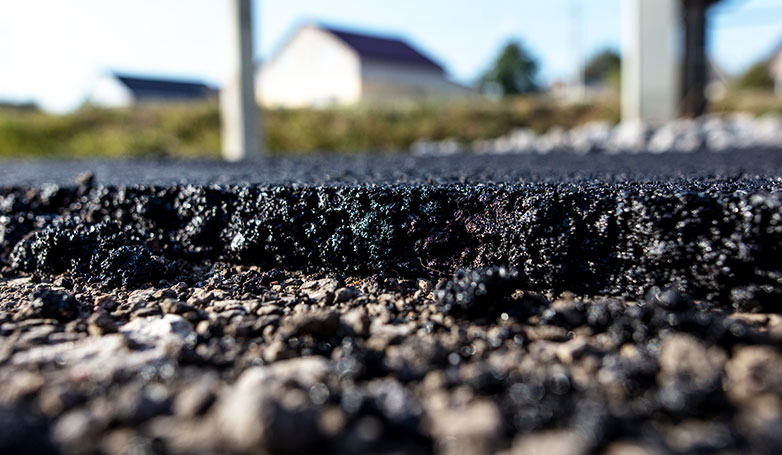
Larger cracks or potholes, especially those deeper than one or two inches, require a slightly different approach. Initially, fill these deeper areas with fine sand or crushed gravel. This acts as a base and reduces the amount of crack filler needed. Once the gravel is in place, use a steel tamper to compact and level it. After this, apply the rubberized asphalt emulsion crack filler. It’s essential to refer to the manufacturer’s instructions regarding the curing time of the filler, as this can vary between products.
5. Compacting and Leveling the Gravel
The added step for larger cracks involves compacting the gravel or sand used as the base. This compaction is crucial for stability and to prevent future sinking or shifting of the material. Use a steel tamper for effective compaction, ensuring a firm and even base before applying the crack filler.
6. Final Smoothing and Drying
Once you apply the crack filler, whether for small or large cracks, gently smooth the surface as the final step. Use a trowel or a similar tool for this. Make sure to spread the filler evenly over and within the crack, removing any uneven spots. The final step is to allow the filler to dry completely. Drying times can vary, so it’s essential to check the product’s specifications. Avoid using the driveway until the filler has fully cured to ensure a long-lasting repair.
Why is my asphalt driveway cracking?
Any asphalt can develop cracks due to variations in moisture retention and temperature. Let’s detail how every season of the year might impact your driveway. We will also look at other factors that affect the overall health of your driveway.
The Freezing and Thawing Cycles in The Winters
After significant snowfall or rain, moisture will penetrate the surface and soak into the ground below. The moisture then expands due to temperature changes, causing the asphalt to crack. The winter’s sequence of freezing and thawing produces the majority of cracks you might find on your driveway.
The Expansion of Asphalt in The Summer
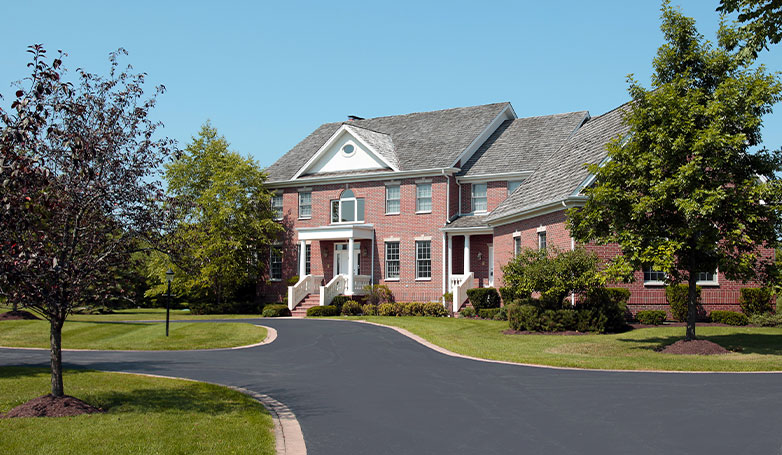
Asphalt may expand under the strain of intense heat, leading to fissures. The heat can also cause cracks in your driveway during the hottest parts of the summer when the hours seem to disappear for “years,” and the temperatures soar to dangerous heights. These fissures might grow into more serious issues if not addressed.
The Age of Your Asphalt Driveway
Your asphalt susceptibility to deterioration depends heavily on its age. Asphalt driveways’ propensity to break increases with age. As time goes on, the substance starts to deteriorate and loses its inherent capacity to endure the pressures that your surface is subjected to daily.
Older roads are, therefore, more likely to sustain damage when heavy rain or a freeze-thaw cycle occurs.
Movements of The Earth’s Plate

The ground moving beneath your asphalt is a principal reason for cracking asphalt. The earth’s plate is always moving. The majority of asphalt driveways are built on top of the gravel. During the lifetime of your driveway, the gravel underneath will be affected by the ground’s movement and cause cracks to emerge.
The movement might be due to the earth’s natural sequence or strong storms. Whatever the case, it is always safer to fix them immediately to protect your tires from damage.
Should cracks in the asphalt driveway be repaired?
Cracks on asphalts should always be repaired. Here’s why: If your asphalt develops a crack, it will probably continue to expand if you don’t fill it in. The stresses that caused the first crack to propagate still exert pressure on the pavement, which causes the cracks to enlarge.
Moisture entering the cracked asphalt expands when it freezes or dries off, causing the pavement to become more spaced. These spaces weaken the integral material of your asphalt and, with time, become a permanent weak spot on your driveway. These weak spots might always pose a problem even after the cracks have been sealed. To protect your driveway and enjoy a long-lasting tarred road, it is best if you remedy cracks the moment they are observed.
Applying a fresh sealant layer on cracked asphalt is the best way to prevent weakness on your driveway. Read our simple step-by-step guide to find out how cracks on asphalt are repaired.
What are the best products to fill asphalt driveway cracks?
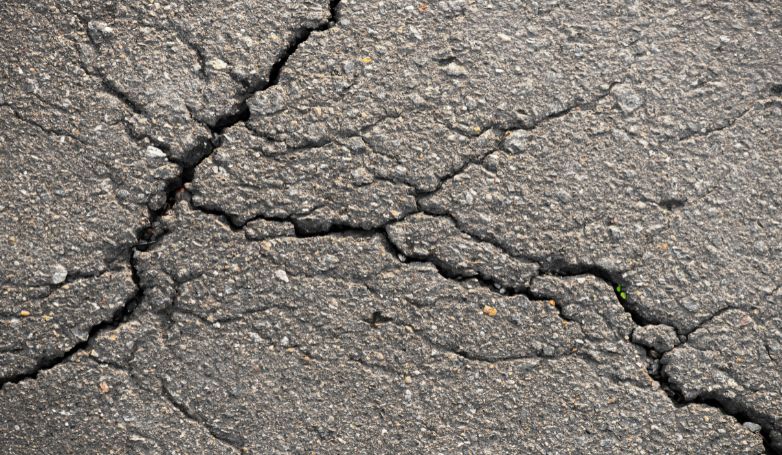
The best products will help you repair your crack and cure the damages faster. They will also maintain your asphalt driveway integrity until you completely replace your driveway pavement. It’s important to monitor your driveway and address every damage before they become bigger. Once cracks and potholes are on your asphalt driveway, they will open up more and absorb liquid; it’s already known that moisture is our pavement’s worst enemy.
It’s important to choose your asphalt repair methods carefully; you must be able to tell if the crack is a single crack or a road map of cracks (multiple). Below is a list of the best products you can use to fill your asphalt pavement.
Latex-ite – Pli-Stix 60 ft. Small Black Permanent Blacktop Joint and crack filler
Latex-ite is designed to be used with a propane torch or a heat gun. This asphalt driveway crack filler is great for small cracks and has no volition organic compounds in it. It also cures your crack fast, and your driveway is healthy and ready for traffic in about twenty minutes.
Road Rescue 50 lbs. Asphalt Repair
When your cracks widen into potholes, road rescue will help you fix them. Road rescue 50 Ibs works in any weather and covers 7 square ft at a depth of 1 inch. It’s also inexpensive, helps get the work done fast, and requires no special tool for application.
USEAL USA 3.5 lb. Driveway Crack Sealer Refill
An easy-to-apply formula always saves time and energy. This product is used for sealing cracks and doubling pavement life. It’s easy to use and dries in twenty minutes.
Flex-A-Fill 30 lb. Box Black Pavement Crack Repair Sealant
Flex A is efficient in sealing asphalt driveway cracks. It is a hot-poured polymer-modified asphalt sealant that seals your cracks and resists cracking during winter. This product strongly adheres and bonds your asphalt crack walls together. It’s environmentally friendly and rapidly set in.
Gardner DriveSeal 8 Driveway Filler and Sealer
Gardner driveway seal is durable and provides excellent lasting protection to your driveways. It’s full of small cracks and protects your asphalt pavement against extreme weather. Driveway filler and sealer are easy to apply and give you a smooth finish.
FAQs about repairing cracks in an asphalt driveway
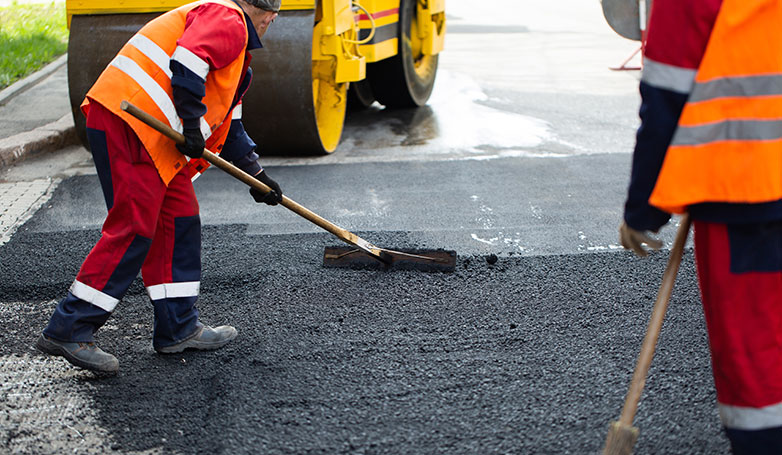
Below are some frequently asked questions (FAQs) that shed light on the best practices and materials needed for effectively repairing cracks in asphalt driveways:
What is the best way to repair cracks in asphalt?
The best way to repair cracks in an asphalt driveway is through a meticulous and systematic approach. Start by thoroughly cleaning the crack using a chisel, wire brush, and pressure washer to remove debris and loose asphalt. Next, select an appropriate asphalt crack filler based on the size of the crack. For small cracks, a rubberized asphalt emulsion crack filler is ideal. Apply the filler carefully, ensuring it completely fills the crack. For larger cracks, fill the base with sand or crushed gravel before applying the crack filler. Finally, smooth the surface and allow adequate time for the filler to cure, following the manufacturer’s instructions.
What is the best crack filler for asphalt driveway?
The best crack filler for an asphalt driveway typically depends on the size and severity of the cracks. For small, narrow cracks, a rubberized asphalt emulsion crack filler is recommended due to its flexibility and durability. For larger cracks and potholes, a combination of crushed gravel or sand as a base, topped with a high-quality, rubberized asphalt compound is effective. It’s important to choose a filler that is weather-resistant and capable of adhering to the existing asphalt for a long-lasting repair.
Can a badly cracked driveway be repaired?
Yes, a badly cracked asphalt driveway can be repaired, but the extent and nature of the damage will determine the repair method. If the cracks are widespread and deep, indicating significant underlying issues, it may require more extensive repair techniques, such as removing and replacing sections of the driveway, or a full resurfacing. In some cases, if the structural integrity of the driveway is compromised, complete replacement might be the most cost-effective and long-lasting solution.
Can large cracks in the driveway be repaired?
You can indeed repair large cracks in an asphalt driveway, but the process is more involved than fixing smaller cracks. The repair of large cracks involves cleaning out the crack thoroughly and filling it with a base material such as crushed gravel or sand, if very deep. Properly compact the base material before applying a layer of rubberized asphalt crack filler. Then smooth the surface and let it fully cure. It’s crucial to address large cracks promptly, as they can lead to more significant issues, including further cracking and water damage to the base layers of the driveway.
Conclusion
The most common cause of cracks on asphalt driveways is moisture that has found its way below your pavement surface. This will cause expansion and contraction, and your asphalt pavement will break with freezing and thawing. Repairing your asphalt pavement will allow it to survive extreme weather conditions. It will also close up the cracks and prevent mounting from seeping in. Seal your asphalt driveway after repairing the cracks to protect it against more damage.

